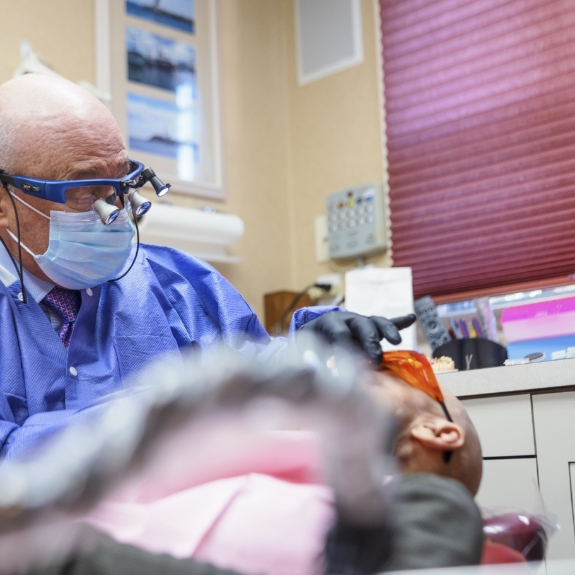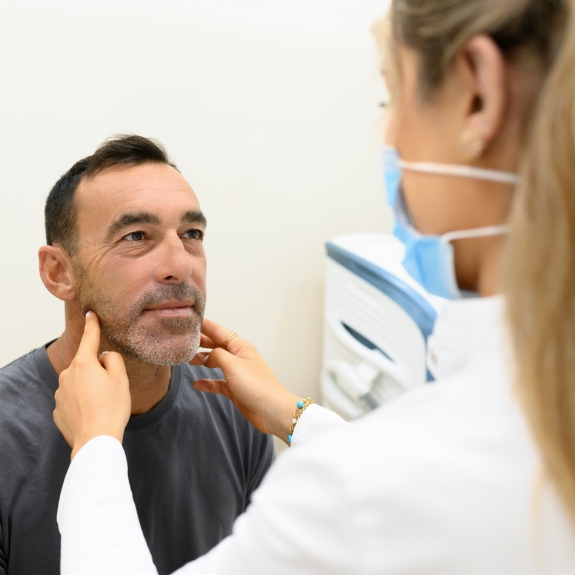Dental Implant Candidates Massapequa Park • Long Island
Are You a Good Candidate for Dental Implants?

Pretty much everyone with missing teeth can benefit from dental implants; however, there are a few requirements a patient must have for the treatment to be a viable option. What are they? If you’re lacking any of them, does that mean implants are permanently off the table? Below, we explain what a dental implant candidate in Massapequa Park needs to have before they begin treatment, as well as what people can do if they are missing one or more of the requirements.
Why Choose Smile Creations for Dental Implants?
- Our Dentists & “Dream Team” Oral Surgeons & Periodontists Deliver Optimal Results
- Thousands of Successful Start-to-Finish Cases
- Dental Team That Ensures Greater Hospitality and Care
1. Good Dental Health

The placement of dental implants involves positioning a small titanium post directly into the jawbone so it can support a brand-new replacement tooth that shows above the gumline. Sounds pretty straightforward, right? For someone with good dental health, the implant process is usually quite simple; however, for those with dental problems, they will need to be addressed before implants can be safely placed.
Specifically, an issue like periodontal (gum) disease can pose a particular problem for implant placement because it could potentially weaken the bone needed to support the new root over time. If a patient who is interested in getting dental implants does have gum disease, Dr. Mohr or Dr. Ariel will eliminate the infection before having their new teeth placed. It’s one of the best ways to ensure the long-term success of the treatment.
2. Stable Overall Health

While dental implant surgery is minor, it is still surgery, so a patient needs to be healthy enough. Issues like uncontrolled diabetes or cardiovascular problems can put a patient’s health at serious risk during oral surgery, and these are complications we want to avoid!
If you have an overall health issue that could interfere with your implant placement, your dentist will recommend that you visit your general doctor to make sure it’s under control before you begin the process.
3. Enough Healthy Jawbone

The reason dental implants are so stable and secure is because they are placed directly into the thick jawbone just like natural teeth. However, for someone who has been dealing with tooth loss for a long time, their jawbone may be quite thin and brittle, as bone loss is a very common symptom of tooth loss.
If a patient’s jawbone isn’t thick enough to firmly hold implants, your dentist will suggest they get a bone graft. This involves combining existing and new bone material to strengthen the area of the jawbone that is going to house the implants. To complete this procedure, we’ll refer a patient to one of our “dream team” oral surgeons that we have worked with for many years.
How to Determine If You Are a Good Dental Implant Candidate

If it sounds like you meet all of these requirements, and you’re ready to get implants to replace your missing teeth, then we invite you to schedule an in-person consultation. At this appointment, Dr. Mohr or Dr. Ariel will examine your mouth to spot any issues that might cause complications down the road. Once they give you the thumbs up, you can rest assured that your implant process will be smooth from beginning to end.
Schedule an Appointment Today

As we mentioned at the top of this page, implants can help practically anyone with missing teeth, and with our team, we can use them to rebuild your beautiful smile for a lifetime. To see if you’re a good candidate and ready to start the dental implant procedure, contact us today to schedule an appointment.
Candidates for Dental Implants FAQs
Can Teenagers Get Dental Implants?
A patient must have a fully developed jaw before they are eligible to receive dental implants. Therefore, most people under 17 or 18 years of age are not candidates for the procedure. If your teen is struggling with tooth loss, they may be a candidate for dental implants in a few years.
Can I Get Dental Implants If I Have Osteoporosis?
If you have been diagnosed with osteoporosis, be sure to include that in your medical history when you are filling out forms for our practice. Your condition will not necessarily bar you from receiving dental implants. There is even research to suggest that dental implants can protect women with osteoporosis from suffering bone death in the jaw due to bisphosphonate medications.
I Smoke Cigarettes. Will That Affect My Candidacy for Dental Implants?
Tobacco usage is a major risk factor for gum disease and other oral health problems. It can also slow down healing after surgery and increase the risk of dental implant failure. If you smoke, your oral surgeon may strongly urge you to kick the habit at least two weeks before your implant placement surgery and continue to abstain until your mouth recovers.
What Is It Like to Get a Bone Graft?
There are different types of bone grafts. If you need a minor graft, your surgeon might perform it on the same day they place your implants. If you have more extensive grafting needs, you might need to go through a healing period before you can receive implants. In some cases, a bone graft in the upper jaw also requires that the sinus be moved slightly upward - a procedure known as a sinus lift. Your surgeon will provide you with the details of your procedure before the day of your appointment.
Will Any of My Natural Teeth Need to Be Extracted?
In most cases, tooth extractions are not necessary before dental implant placement. However, if your remaining natural teeth have suffered significant damage, we may recommend that you get them removed and replace them with strong, sturdy, and long-lasting implant-supported prosthetics.










